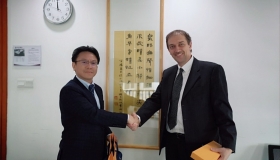From Prisoner’s Dilemma to Game Theory
The vision of SME is a TV program launched at the Chinese University of Hong Kong (Shenzhen). In this program, various professors are invited to speak about the way of how they interpret management philosophy in order to guide the public the fields of economic and management research. Based on their own broad knowledge, the professors select representative topics and share them with the audience.
In the first show, we invited Mr. Song Yangbo, who helped everyone to understand a basic problem in game theory: prisoner’s dilemma.

Education background:UCLA Economic doctor
HKU Bachelor of economic and financial (Minor in Statistics)
Research area: Game theory, network economics, contract theory, mechanism design
Course: Game theory and business strategy, advance microeconomics
Before introducing the theory, Professor Song began his lecture with a short story. A and B, two students, co-cheated during the mid-term examination, and they were immediately caught. The professors took them to different rooms, making sure they were unable to communicate with each other and told them:
1. If both of them deny that they cheated, then the professor lacks evidence and he can only cancel both their midterm results.
2. If both of them admit that they cheated, then the professor obtains the evidence, and he will report to the college and cancel the course results of these two students.
3. If A admits and B denies, then the professor would also have evidence to report to the College. And A would not be punished, whereas B would be expelled from the faculty.
If B denies that he cheated, then how will A choose to be more cost-effective? If A denies, then his result of the mid-test will be zero; if he admits, then he will not be punished. What if B admits? At this point if A denies, he will be dismissed; if he admits, then he just fails the course. Therefore, the only choice of "confession" would be more beneficial for both of them.
The prisoner's dilemma is one of the introductory topics in game theory. Game theory mainly studies the behavior of rational decision makers in strategic situations. It predicts and analyzes the equilibrium results and each side of the game tries to maximize its own interests which can provide a theoretical basis and a direction guidance for actual decisions (such as financial investment, trading contracts, market specifications, information delivery, etc.).




